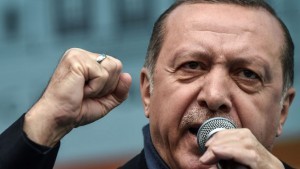A Turkish banker, sanctions and Iran − the plot thickens as the NYPD arrests an executive suspected of helping transfer funds to Iran when sanctions were firmly in place.
The New York police arrested the deputy chief of Turkey’s fifth-largest bank last week for suspected involvement in transferring hundreds of millions of dollars to Iran when the Islamic Republic was under U.S. and international sanctions.
The arrest of Mehmet Hakan Atilla follows an investigation into Turkish-Iranian billionaire Reza Zarrab, who acted as a go-between between Tehran and foreign companies and is suspected of huge money laundering via the bank, Halkbank, and other means.
The investigation into Zarrab, who was arrested in Turkey three years ago and released shortly afterward, caused problems for Anarka; four ministers and their sons fell under suspicion − not to mention the son of President Recep Tayyip Erdogan. As a result, another investigation was launched in Turkey into the ministers and Halkbank CEO Suleyman Aslan, an Erdogan confidant in whose home $4.5 million in cash was found in shoeboxes.
Ankara’s investigations into the ministers petered out, but in the United States, where sanctions violations can draw a 20-year prison sentence, the Treasury kept on investigating the affair, which branched out in intriguing directions.
Zarrab, who was arrested again in Miami in March 2016, is employing 20 top New York lawyers, and this week he added former Mayor Rudy Giuliani to the list, along with Michael Mukasey, an attorney general under President George W. Bush who was Giuliani’s adviser in the presidential race and helped craft the U.S. executive order to bar entry to citizens of seven largely Muslim countries.
The law firm where the two men work also represents banks that were stung by Zarrab’s activities, and the head of Zarrab’s defense team is Benjamin Brafman, a noted friend of Israel who’s also the lawyer for Israeli businessman Kobi Alexander, who has had legal problems of his own.
Back in Turkey, Erdogan was expected to discuss Atilla’s arrest Thursday with U.S. Secretary of State Rex Tillerson, who is visiting to discuss U.S.-Turkish cooperation on the Syrian civil war. The visit is part of the effort to mend the rift between Ankara and Washington under President Barack Obama, though Atilla’s arrest is liable to raise tensions once again.
When Zarrab was arrested in Turkey and the investigation was launched into the Turkish ministers, Erdogan wasted no time in accusing the United States of “foreign considerations,” which were interpreted in Turkey as an American effort to damage Erdogan and possibly even oust him from power.
Predictably, the Americans’ denial was of no use, and Erdogan launched a campaign to cleanse the Turkish judiciary of anyone deemed part of the movement of Fethullah Gulen, who Erdogan claimed leaked information about the investigations and the involvement of the ministers and Erdogan’s son.
Now too, close Erdogan associates, and perhaps the president himself, believe that someone in the U.S. administration seeks to undermine the Erdogan regime using the investigation. Until a month ago, the Turks were accusing New York District Attorney Preet Bharara, who was overseeing the Zarrab investigation, of an affiliation with Gulen’s organization, citing this as the reason for his “obsession” with exposing Turkish corruption.
But on March 11, U.S. President Donald Trump fired Bharara, who had refused the Justice Department’s request to resign along with the other 45 district attorneys appointed by Obama. A leading candidate to replace Bharara is Mark Mukasey, son of Michael Mukasey of Giuliani’s firm. Ankara warmly welcomed Bharara’s dismissal, believing that the noose of the investigation might be loosened a bit.
But Atilla’s arrest put the lie to that hope. Halkbank shares plunged 16 percent on Wednesday, while the Turkish lira tumbled more than 1 percent.
So far Erdogan has managed to evade the fallout of the corruption scandal, largely thanks to his assault on the Turkish justice system − the firing of hundreds of judges and prosecutors with the massive help of parliament, which rejected a request to hand over the ministers to a court for investigation.
But Erdogan can’t relax just yet. The top banker who was just arrested in New York, and Zarrab too, could open their mouths and supply interesting information entangling Erdogan and Turkish banking officials in the affair.
The question is to what extent could Trump, if he so desires, intervene in an investigation being “overseen” by some of his closest friends.
Ask me anything
Explore related questions





